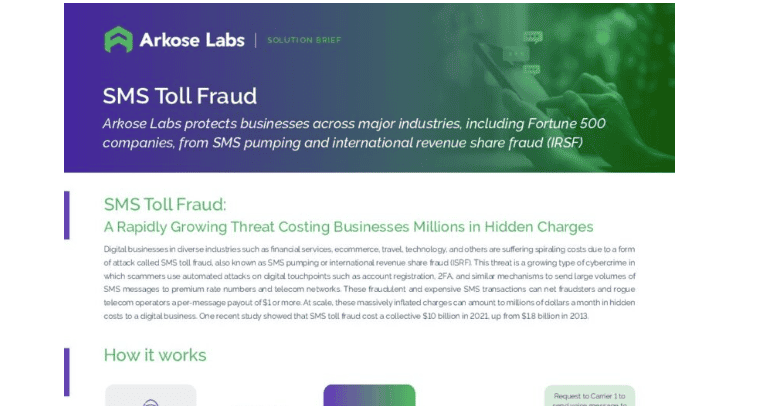SMS Traffic Monitoring: Stay Secure, Stay Ahead
SMS has become a vital communication tool for businesses in today's digital landscape, facilitating seamless text message exchanges that are crucial for interactions between companies and customers. But as with other technological advancements, bad actors seek to exploit its capabilities for their own benefit.
A concerning rise in SMS toll fraud and other types of SMS attacks is leaving consumers and businesses vulnerable to financial losses, reputational damage, legal repercussions, privacy violations, and other dangers.
Recognizing the true nature of your SMS traffic becomes imperative in combating such risks. By implementing SMS traffic monitoring, you can effectively identify and preempt cyberattacks and other security threats that jeopardize the integrity of SMS communications.
What Is SMS Traffic Monitoring?
SMS traffic monitoring is the process of examining SMS messages with the purpose of identifying and preventing cyberattacks and other threats that could compromise the security of these communications. SMS traffic monitoring is often used to monitor financial transactions and protect sensitive information from vulnerabilities like spam and phishing attacks.
Benefits of SMS Traffic Monitoring
SMS traffic monitoring offers multiple benefits:
- Security Enhancement: By monitoring SMS traffic, potential cyberattacks, malicious activities, and security vulnerabilities can be detected and prevented. This proactive approach strengthens the security of SMS communications, protecting sensitive information and user privacy.
- Abuse Prevention: SMS traffic monitoring helps identify and prevent deceitful activities such as SMS toll fraud, spam, and phishing attacks. It enables early detection of suspicious patterns and unauthorized activities, minimizing financial losses and protecting users from scams.
- Compliance and Regulatory Requirements: Many industries, such as finance and healthcare, have strict regulatory requirements regarding the protection of sensitive information. SMS traffic monitoring helps ensure compliance with these regulations, reducing the risk of penalties and legal consequences.
- Improved Incident Response: With SMS traffic monitoring in place, organizations can quickly identify and respond to security incidents. Prompt detection allows for timely investigation, mitigation, and recovery, minimizing the potential impact and damage caused by security breaches.
- Operational Efficiency: Monitoring SMS traffic provides valuable insights into usage patterns, message delivery rates, and network performance. This information can be used to optimize SMS infrastructure, improve service quality, and enhance overall operational efficiency.
- Customer Trust and Reputation: By actively monitoring SMS traffic and taking measures to protect users, businesses demonstrate their commitment to security and privacy. This fosters customer trust, enhances reputation, and establishes a competitive advantage in the marketplace.
How SMS Traffic Monitoring Works
While specific implementation details may vary, here are the general steps involved in SMS traffic monitoring:
- Data collection: Collect SMS traffic data from the network.
- Data capture: Intercept and log SMS messages.
- Data decoding: Convert captured data into a readable format.
- Data storage: Store decoded data for analysis.
- Traffic analysis: Analyze data for insights and patterns.
- Visualization and reporting: Present findings through visualizations and reports.
- Alerting and notifications: Generate alerts for real-time monitoring.
- Compliance and regulatory considerations: Review traffic to ensure adherence to requirements.
Importance of SMS Analytics
SMS analysis plays a crucial role in protecting against cyberattacks by leveraging various techniques. Through anomaly detection, it can identify suspicious patterns and behaviors in SMS traffic that may indicate an ongoing attack. By analyzing message content and metadata, it provides valuable threat intelligence, helping organizations stay informed about emerging attack vectors and phishing attempts. Keyword filtering enables the identification and blocking of messages containing malicious content.
Additionally, reputation analysis helps in recognizing known malicious entities and blocking their messages. Content inspection techniques detect harmful elements within messages, while user behavior analysis identifies abnormal patterns signaling potential compromises. Overall, SMS analysis strengthens security measures and supports effective incident response efforts.
Types of SMS Alerts
SMS alerts are critical in safeguarding against cyberattacks on your mobile network. You can prevent access attempts by cyberattackers and unauthorized third-party aggregators with real-time notifications through SMS traffic monitoring. Analyzing parameters like phone number nodes or API connections helps identify vulnerabilities in the network traffic. In addition, SMS analytics tools provide insights into customer behavior to boost marketing strategies. These alerts notify you of suspicious activity or unusual network traffic patterns, protecting sensitive information from potential data breaches.
Why SMS Security Is Crucial
SMS traffic monitoring plays a vital role in safeguarding both personal and business information from cyber threats. Cybercriminals often seek vulnerabilities in text messages to gain unauthorized access to devices or inject them with malware. This makes it essential to implement SMS security measures like two-factor authentication for secure communication. Using tools that protect against SMS toll fraud and other SMS attacks can help identify suspicious activity while also providing valuable insights into legitimate customer preferences.
Common SMS Cyberattacks
Cybercriminals exploit vulnerabilities in SMS traffic to carry out malicious activities. Attackers use sources like APIs, servers, nodes, and aggregators to send SMS messages with phishing links or malware distribution. Hackers also use spoofed sender IDs to deceive people into believing they are from trusted sources.
SMS traffic monitoring helps detect and block these cyberattacks with real-time analytics and alerts when there is unusual activity or unauthorized access. Implementing secure SMS communications with two-factor authentication and notifications for system failures can prevent scammers from carrying out their plans. Here are two of the most common forms of SMS cyberattack:
SMS Toll Fraud/International Revenue Share Fraud (IRSF)
SMS toll fraud, also known as SMS pumping or IRSF, is a deceptive practice where individuals or entities send text messages to mobile phone users, charging them premium rates without their consent. Cybercriminals often exploit short codes or premium-rate phone numbers, which incur high costs for each received message, and they may employ phishing scams or malware to deceive users into subscribing to costly services or unknowingly granting consent for premium-rate messages. SMS toll fraud can result in significant financial losses, credit score damage, and reputational harm.
Smishing Attacks
The term "smishing" is a combination of "SMS" and "phishing." Phishing typically refers to fraudulent attempts to obtain sensitive information, such as passwords or credit card details, by disguising oneself as a trustworthy entity through email or other electronic communications. In the case of smishing, attackers send deceptive text messages to trick recipients into divulging personal information, visiting malicious websites, downloading malware-infected attachments, or taking other actions that can compromise their security. These messages often appear to be from a legitimate source, such as a well-known company, financial institution, or government agency, to gain the recipient's trust.
Arkose Labs Stops SMS Attacks Before They Happen
To ensure secure SMS communications, implementing SMS traffic monitoring solutions is essential. Attackers who want to make money through SMS attacks frequently use malicious bots, which are software designed to automate tasks online.
With Arkose Bot Manager's anti-automation technology, businesses can detect and prevent these bots used in SMS toll fraud and other SMS attacks in real time. By integrating Arkose Labs at touchpoints protected by one-time passwords, malicious traffic can be identified and challenged effectively. The solution employs real-time risk assessment and interactive challenges for in-session authentication, reducing reliance on traditional multi-factor authentication methods. Moreover, Arkose Labs offers a $1 million SMS Toll Fraud Warranty as part of our managed services.
To learn more about Arkose Bot Manager, get a demo today!

SMS Toll Fraud
- SMS Traffic Monitoring: Stay Secure, Stay Ahead
- What Is SMS Traffic Monitoring?
- Benefits of SMS Traffic Monitoring
- How SMS Traffic Monitoring Works
- Importance of SMS Analytics
- Types of SMS Alerts
- Why SMS Security Is Crucial
- Common SMS Cyberattacks
- SMS Toll Fraud/International Revenue Share Fraud (IRSF)
- Smishing Attacks
- Arkose Labs Stops SMS Attacks Before They Happen


